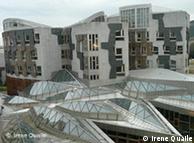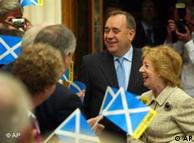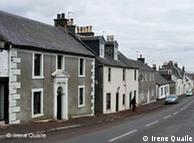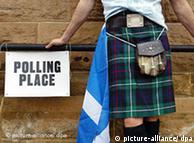Elections | 02.05.2010
Scottish voters could prove decisive factor in British election
On May 6th, the people of the UK will be electing a new parliament. That includes people north of the English border in Scotland, the home country of prime minister Gordon Brown.
Although they have their own additional devolved parliament in Edinburgh, the Scots also send MPs to London. Although it only accounts for 59 of the 630 seats, the vote in Scotland could play a decisive role in determining the outcome of the general election.
Edinburgh's Princes Street is busy as usual. The city's main shopping street attracts locals and tourists alike. Amongst them is Sheila Gilmore. The Labour Party candidate for Edinburgh East is on her way to her next campaign appointment. The elections for the British parliament are very important to Scotland, says Gilmore.
"We do have our own devolved parliament that looks after our domestic issues, but the overall the funding package is determined by the UK government. The economy, which is important to everybody in Scotland, will be affected by who's in government and the kind of policies they follow."
 Bildunterschrift: Großansicht des Bildes mit der Bildunterschrift: Scotland has had its own devolved parliament since 1999
Bildunterschrift: Großansicht des Bildes mit der Bildunterschrift: Scotland has had its own devolved parliament since 1999
Labour versus Scottish Nationalists?
Traditionally, Scotland is considered a Labour bastion, and Gilmore, who's seat has been Labour for decades, is confident that's the way it will stay. But prime minister Gordon Brown's party has lost support across the country – including Scotland.
At the last election to the Scottish Parliament in 2007, which is run on the basis of proportional representation instead of the UK's "first-past-the-post" system, Labour didn't win enough seats to form a government. The country is now ruled by a minority adminsitration formed by the pro-independence Scottish National Party.
That gives the election a "different buzz from south of the border," says Eberhard Bort from the School of Governance at Edinburgh University. Only 25 to 30% of Scots really want independence from the rest of the UK, he says. But it seems the Scots like devoloution - "especially with a Nationalist government," says Bort with a smile.
The opinion polls indicate it's unlikely that Labour will win the UK election on May the 6th. The best Brown can hope for is a hung parliament, with Labour winning most seats. But for that, he must succeed here in Scotland, according to political analyst Bort.
Chris Harvie shares his view. The Professor of Politics sits in the Scottish Parliament for the Scottish National Party. He says Labour is dependent on a "substantial return" of Labour seats in Scotland. "Of the 59 seats, they would expect up to 45 to return Labour candidates," says Harvie, himself a former Labour man. "If not, Scotland has become a liability rather than an asset to Labour."
This could benefit his own party, says Harvie. SNP leader and Scottish FirstMinister Alex Salmond hopes his party can increase ist current 7 seats to 20 in the election and has been actively campaigning for a hung parliament, which would give a lot of bargaining power to small parties.
 Bildunterschrift: Großansicht des Bildes mit der Bildunterschrift: Scottish National party leader Alex Salmond was voted First Minister in 2007.
Bildunterschrift: Großansicht des Bildes mit der Bildunterschrift: Scottish National party leader Alex Salmond was voted First Minister in 2007.
The Ghost of "Maggie" Thatcher
In spite of the unpopularity of the present Labour government, which can be attributed partly to the economic crisis, partly to Britain's role in Iraq and Afghanistan, the polls are not predicting a huge victory for the Conservatives. They too, badly need to win seats in Scotland.
At the moment they have only one Scottish constituency seat in the Westminster parliament. But in the Scottish parliament, which operates on a system of proportional representation, they have been able to win 17 seats. John Lamont has one of them. Now, the young Conservative hopes to win the seat in Westminster for his constituency of Berwickshire, Roxburgh and Selkirk in the Scottish borders. But the Conservatives have an image problem. Lamont is convinced his party's policies would go down well with the voters. Bildunterschrift: Großansicht des Bildes mit der Bildunterschrift: In traditional Scottish villages, support for the Conservatives is minimal
Bildunterschrift: Großansicht des Bildes mit der Bildunterschrift: In traditional Scottish villages, support for the Conservatives is minimal
"But the Conservative brand is perceived as anti-Scotland," he says, and people still mention Mrs Thatcher, who introduced some measures very unpoplar with the people of Scotland, as a reason not to vote Conservative. "Amazing, that was 20 years ago," says Lamont, "I was barely born then!"
A major force across the UK - the "LibDems"
The other party playing a bigger role than ever before in this election, in Scotland and across the UK, are the Liberal Democrats. If neither Labour nor Conservatives gain an absolute majority, the LibDems will become extremely influential in British politics, either as a potential coalition partner or in tolerating a minority government. Party leaders are trying hard not to be drawn on that issue.
"I don't think it's clever to speculate on what parliament will look like", says Tavish Scott, head of the LibDems in Scotland. "The number one need is to get the deficit under control and deal with the state of public finances, which are in an awful crisis in the UK."
Another of his party's main aims is to "clean up" politics. Here, the Liberal Democrat hits a note that most voters are concerned about. After numerous scandals, many people across the UK are getting tired of politics.
"I worry that the expenses scandal that has taken place in the House of Commons over the last year or so has turned many people off politics," says Scott, "and that many people will say we're all as bad as each other and I don't want anything to do with any of you." He fears that could result in a low turnout.
 Bildunterschrift: Großansicht des Bildes mit der Bildunterschrift: Scandals in London could affect the way the Scottish capital votes
Bildunterschrift: Großansicht des Bildes mit der Bildunterschrift: Scandals in London could affect the way the Scottish capital votes
Talking to voters back out on Princes Street, it seems as if Tavish Scott could have hit the nail on the head.
"You vote for the party you always voted for," says one passer-by. "But when the policies come across, they're all shouting the same sort of thing. And lately, after all the scandals, you feel a bit disillusioned with them all."
"Well to be quite honest, there isn't much choosing between the parties," adds a shopper. "They're all too busy doing their own thing. I wish they would actually think of the public and what we want, instead of promising us everything, then, when they come into power, it's just the same as ever."
Author: Irene Quaile
Editor: Rob Turner

沒有留言:
張貼留言